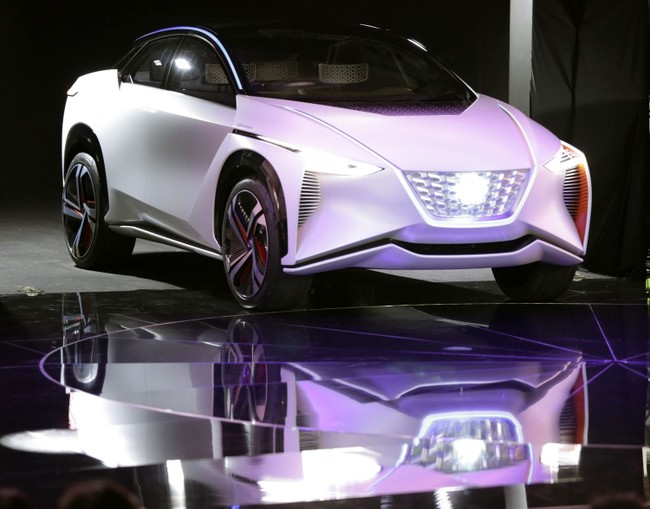We support our Publishers and Content Creators. You can view this story on their website by CLICKING HERE.

I don’t know that it’s any wonder autoworkers went for Donald Trump in big numbers. They might talk a union line in the shop, but holy smokes.
Democrats have not come through for them on the assembly line. The job slashing at Stellantis, parent company of Dodge and Jeep, started in August.
Advertisement
Michigan union members blame Biden electric-vehicle mandates for auto-industry layoffs: ‘Want to slit our throats’
The auto industry is big business in Michigan, and a major round of layoffs is revving the election into high gear for industry workers in the critical swing state — who blame the Biden-Harris administration’s heavy-handed electric-vehicle mandates for the painful job losses.
Stellantis, which manufactures Chrysler, Jeep and Dodge vehicles, announced last month it will lay off 2,450 workers at its Warren plant. While industry jobs in the state have been declining since 1990, Michigan autoworkers explained to The Post why Team Biden’s green-energy rules are at fault this time.
It’s going to be a Grinchy Christmas for a fair number of American autoworkers, as the company is looking at shaving another 1100+ jobs from a facility in Toledo, Ohio.
…Following a disturbing trend of recent auto worker layoffs, auto giant Stellantis notified 1,100 Toledo workers, members of UAW Local 12, that they will be indefinitely laid off. These layoffs at the Toledo Assembly Plant, where they produce the Jeep Wrangler, Jeep Wrangler 4xe, and Gladiator, are coming after cutting jobs at Warren Truck in southeast Michigan, where they build the Tradesman pickup truck.
Additionally, workers at the Freud Street parts sequencing facility in Detroit, Indiana Transmission, and Detroit Assembly Complex-Mack are also facing indefinite layoffs. Stellantis is also trying to move the Dodge Durango out of the U.S. to a plant in Windsor, Ontario. The union has had enough with the broken promises, they said, and are ready to engage in strike activity to hold the company accountable to its end of the bargain.
Advertisement
Now, the link above is from a union trade paper, but it gives you an accurate idea of what the “indefinite” layoff picture looks like. The Toledo plant where these guys put Jeep products together has been the victim of a precipitous drop off in sales of one of those vehicles.
…The Jeep Gladiator jumped into the midsize pickup fray in 2019 as a versatile entry that brought open-air experiences to the segment with its removable top and doors, but the truck’s unique looks and features haven’t been enough to avoid a steep sales drop-off over the past two years.
The UAW, of course, doesn’t look at it through the same lens and is already laying the groundwork for strike authorizations based on the company breaking the agreements signed during their big three-pronged strikes a year ago.
It’s a challenging environment out there for consumers now, as well as car manufacturers…
It’s even worse at Stellantis.
Lot of 2023s on their lots 😆
Stock is still reportedly a value though if you use the prior earnings and ignore how they are guiding to losses next year https://t.co/ZuA6ny6z5S
— 🤠 Weimar Silver Baron 🤠 (@BankerWeimar) November 19, 2024
…but that’s never held a strike back.
Shawn Fain, UAW head, is also looking at holding the incoming Trump administration’s feet to the fire as far as free-trade agreements go.
There are also smaller-scale cutbacks happening in the Arizona desert for both Stellantis and GM as they shut down testing tracks and associated facilities in those remote areas.
Advertisement
The automaker hasn’t completely given up the EV ghost to the extent that, say, Ford has pulled back. But they did announce a pushback to next year for the release of their Ram electric pickup truck. The company CEO, Carlos Tavares, says they want to make sure all the testing is up to snuff.
Stellantis is delaying the launch of its Ram electric pickup trucks from this year until the first half of 2025, as the trans-Atlantic automaker continues testing the vehicles.
CEO Carlos Tavares on Tuesday declined to disclose details about what caused the delays or specific timing on the electric trucks, which include an all-electric “REV” model and an extended-range “Ramcharger” that’s equipped with an electric generator and a gas engine.
“We are just facing a very significant amount of workload, and we want to be very prudent in the way we validate the products, so we take our time, and we make sure that we manage the peak,” Tavares said during an online media event. “We don’t want to rush. … It’s better to take a few weeks more to validate properly than to rush and then to make mistakes in terms of quality. That’s what we are doing now.”
My cynical side is also curious, as they happen to be on track for launching their new Dodge Charger Daytona and Jeep Wagoneer S – both are EV models – by the end of this year, if they want to see what impact Trump’s canxing of the $7500 tax credit has on sales before they go into production goals for the electric Ram.
Advertisement
There are plenty of nervous eyes watching the incoming administration.
Uncertainty over President-elect Donald Trump’s plans for federal tax credits and loan programs supporting American electric vehicle manufacturing could stall Tennessee’s fast-growing electric vehicle and clean energy industries, analysts say.
Tennessee has seen an estimated $12.6 billion in investments in new clean energy projects since the passage of the Inflation Reduction Act under President Joe Biden in 2022, according to an October Washington Post analysis of data from the Massachusetts Institute of Technology and energy think tank Rhodium Group.
…But Trump’s transition team is reportedly planning to scrap the $7500 tax credit for buyers who purchase new electric vehicles, Reuters reported Friday. And the fate of Biden-era clean energy programs remains unclear.
Energy industry analysts worry such a rollback would stymie the balance of producer- and consumer-facing incentives.
“The fundamental thing to understand about that is that the two work in conjunction,” Godfrey said. “It’s not enough just to have one side of that policy … it’s great if we’re standing up factories, but if there’s nobody buying at the end of the assembly line for those components, for that finished vehicle, because we haven’t also helped support that consumption side of the equation … we see great investments that do not actually bear fruit.”
Advertisement
I love how “critics” with no concept of free-market practices complain about the program – waah.
IF WE HAVEN’T HELPED PEOPLE BUY THEM, THEY WON’T BUY THEM
Customers will buy EVs if they want/need/can afford them, and that’s what competition is all about.
The Stellantis CEO says the company will be “adapting” to the Trump administration’s hostility to EV mandates and subsidies by continuing to manufacture ICE and hybrid vehicles.
As the United States anticipates policy changes under President-Elect Donald Trump, Stellantis CEO Carlos Tavares has reaffirmed the company’s commitment to adaptability. Speaking during a visit to a Stellantis facility in western France, Tavares addressed concerns over the potential elimination of the $7,500 electric vehicle (EV) tax credit and its impact on the market.
…The Trump administration is reportedly considering significant tax reforms, including removing incentives for EV purchases. Such a move could stall EV adoption in the U.S., where the transition to electric vehicles has already faced challenges. Tavares emphasized Stellantis’ ability to respond to such developments through its “multi-energy” platform.
This platform allows Stellantis to produce vehicles that accommodate electric, hybrid, and internal combustion engine (ICE) powertrains, ensuring the company can pivot based on market demand. “We need to see what decisions Trump will take, but Stellantis is ready to adapt to different conditions in different regions,” Tavares said.
Advertisement
How awful – Trumpian obstinancy might “stall” the transition to EV adoption. But no worries – Stellantis can be nimble and pivot between modes of transport and the demands of different regions.
In other words, giving consumers the freedom to choose what they drive.
Any more, that’s a foreign concept.
So glad Mr. Tavares is agreeable.

 Conservative
Conservative  Search
Search Trending
Trending Current News
Current News 







